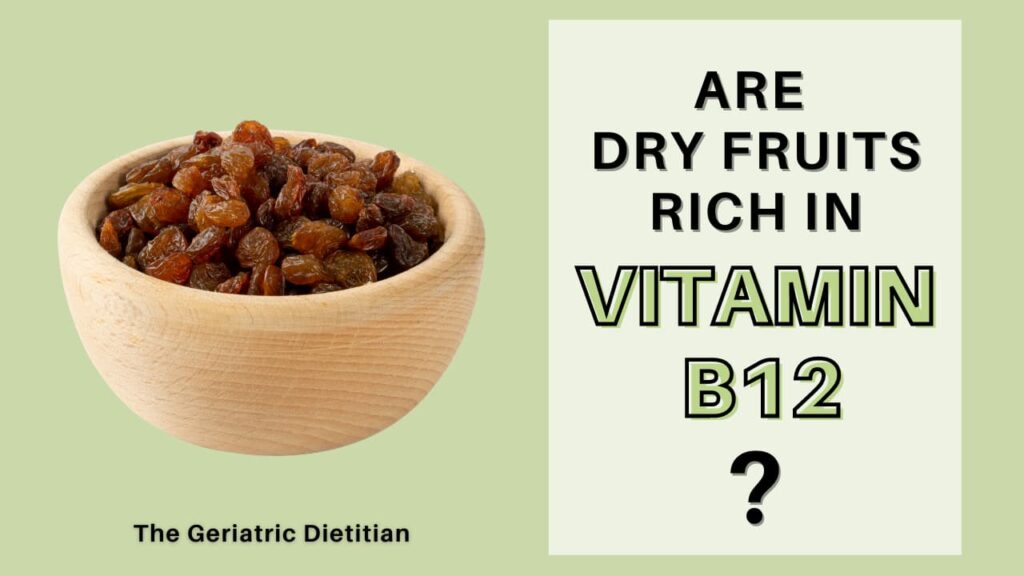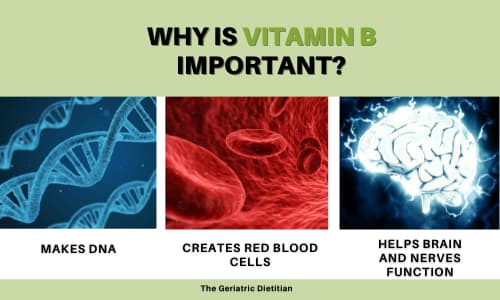“Are Dry Fruits Rich in Vitamin B12?” was written by Mitzi de Maa. Edited/reviewed by Katie Dodd, MS, RDN, CSG, LD, FAND. Mitzi is a dietetic intern based out of Florida.
You likely found this article because you were wondering: are dry fruits rich in vitamin B12? The short answer is no, dry fruits are not rich in vitamin B12.
But there are plenty of other good foods you can eat that are rich in vitamin B12!
Within this article you will learn which foods are best to get more vitamin B12 in your diet. More specifically, you will learn:
- What Vitamin B12 is
- Foods richest in Vitamin B12
- Why the consumption of Vitamin B12 matters
- Vitamin B12 deficiencies
- The importance of Vitamin B12 in the older adult
- How to include more vitamin B12 in your daily diet
Let’s dive in!

What is Vitamin B12?
Vitamin B12 is a water-soluble vitamin. This means that it dissolves in water. Additionally, it needs to be obtained through our diet and in some cases through supplements if indicated by your healthcare provider.
Vitamin B12 helps with:
- The creation of new red blood cells (which are in charge of carrying oxygen from our lungs to every tissue of our body!)
- Making DNA
- Appropriate brain and nerve functioning

Vitamin B12 Food Sources
The main sources of vitamin B12 are animal based such as:
- Beef
- Dairy
- Eggs
- Fish
But vitamin B12 can also be found in other foods such as cereals thanks to a process called fortification.
Fortification which means that Vitamin B12 is added to the food product since it was not originally there. This can be beneficial for vegans or vegetarians since they do not consume animal-based products.
Also, vitamin B12 can be obtained through supplements.

Why Is Vitamin B12 important?
Vitamin B12 is vital because its role in the body is heavily involved in our brain and nervous system functioning normally, the formation of blood and other proteins, and it contributes to the formation of DNA (1).
All of these are important tasks our bodies do on a daily basis!
How Much Vitamin B12 do You Need?
Below is the Recommended Dietary Allowence (RDA) for Vitamin B12:
| Age 19-50 | 51+ | |
| Men | 2.4 mcg | 2.4 mcg |
| Women | 2.4 mcg | 2.4 mcg |
Vitamin B12 Deficiencies
In healthy adults, vitamin B12 deficiencies are not too common. This is because our bodies can store more than 2,500 mcg and its daily turnover in the body is slow.
As noted above, the recommended dietary allowance (RDA) for vitamin B12 is 2.4 mcg per day.
However, Vitamin B12 deficiencies can still occur. Vitamin B12 deficiency may occur if not enough vitamin B12 is consumed or absorbed in the body.
Populations who are at risk of developing Vitamin B12 deficiencies are:
- Older adults
- Pregnant women
- Vegans and vegetarians
- Individuals undergoing weight-loss procedures
Vitamin B12 in Older Adults
Vitamin B12 is especially important for older adults.
This is because as we age, our ability to absorb Vitamin B12 decreases. Using medications can also affect how much Vitamin B12 we absorb (2).
Why Does Absorption of Vitamin B12 Decrease with Aging?
The main reason why older adults absorb less vitamin B12 with aging is because they have less acid production in the stomach. This makes it more difficult to extract this vitamin from the food consumed (3).
Similarly, the use of certain medications decreases their absorption.
Of note, older adults should get half of their vitamin B-12 though fortified foods or supplements (this can just be a good old multivitamin).
Preventing Vitamin B12 Deficiency in Older Adults
Here are some ways to minimize or prevent vitamin B12 deficiency in older adults. Be sure to consult with your healthcare team if you are concerned about deficiency.
- Eat enough protein. Eating the recommended amounts of protein is important since protein is a common source of vitamin B12. Learn more in our article on Protein Requirements for Older Adults.
- Eat fortified foods. Eating foods fortified with Vitamin B12 such as breakfast cereals is beneficial for older adults.
- Consider supplements. Using a Vitamin B12 supplement if instructed by their healthcare provider can be beneficial in older adults. Talk to your doctor to determine if supplements are the best fit for you.
Are Dry Fruits Rich in Vitamin B12?
Now that we have some background on vitamin B12, let’s dig into the question at hand.
You probably clicked on this article looking for this answer. And the answer is no. Dry fruits are not rich in vitamin B12. Vitamin B12 rich foods are either animal-based products or enriched foods such as cereals (read food labels for exact amounts).
Despite dry fruits not being rich in specifically vitamin B12, they are still very nutritious!
Dry fruits are basically fresh fruits that have a lower moisture content. A lower moisture content means that water is removed from it. This in turn helps prevent microorganisms from growing in the fruit making it more shelf stable.
Dry fruits are be rich in:
- Fiber
- Carbohydrates
- Minerals
- Vitamins
Also, frequently consuming dry fruits has an association with both the prevention and/or the management of type 2 diabetes, cardiovascular diseases, and metabolic syndrome (4).
The Dietary Guidelines for Americans, 2020-2025, tells us that ½ cup of dry fruit is the equivalent of 1 cup of fresh fruit. The portion of dry fruit is smaller because the carbohydrate content in the dry fruit is higher than in fresh fruit.
Although Vitamin B12 cannot be found in dry fruits, know that dry fruits can be a nutritious and delicious addition to your daily diet.

Top Foods Highest in Vitamin B12
Here are some of the foods highest in Vitamin B12 by category.
| Category | Food | Serving Size | Vitamin B12 (mcg/serving) |
| Mollusks | Blue mussels (raw) | 1 cup | 18 |
| Octopus (raw) | 3.0 oz | 17 | |
| Wild Eastern Oyster (cooked in moist heat) | 3.0 oz | 14.88 | |
| Farmed Eastern Oyster (raw) | 3.0 oz | 13.77 | |
| Crustaceans | Queen Crab (cooked in moist heat) | 3.0 oz | 8.82 |
| Fish | Pacific Herring (raw) | 3.0 oz | 8.05 |
| Raw blueflish | 1.0 fillet | 8.09 | |
| Atlantic Herring (pickled) | 1.0 cups | 5.98 | |
| Trout (cooked in dry heat) | 1.0 fillet | 4.64 | |
| Pink salmon (canned) | 3.0 oz | 4.21 | |
| Pork | Liverwurst spread | 0.25 cups | 7.4 |
| Braunschweiger (liver sausage) | 1.0 oz | 5.7 | |
| Cheese | Swiss cheese | 1.0 cups | 4.04 |
| Mozzarella (whole milk) | 1.0 cups | 2.55 | |
| Beef | Top sirloin (boneless, separablelean only, trimmed to 0″ fat, select, cooked, roasted) | 3.0 oz | 3.74 |
| Short ribs (boneless, separable lean only,trimmed to 0″ fat, choice, cooked, braised) | 3.0 oz | 3.45 | |
| Whey | Whey (sweet and dried) | 1.0 cups | 3.44 |
Tips to Increase Vitamin B12 in Your Diet
Are you looking at adding more vitamin B12 to your diet? Here are some practical and simple tips to do it!
- Eat Fish Once Per Week.
If you add fish to your weekly meal plan, you get a good serving of vitamin B12! For example, you could get 4.21 mcg of vitamin B12 in one meal by adding a portion of 3.0 oz of canned pink salmon.
Remember, the daily recommended amount is 2.4 mcg which is about half.

Eat more fish!
- Snack on Cheese.
Next time you take a trip to the grocery store, make sure to add some cheese to your cart! Cheese such as mozzarella or Swiss cheese can help you add more Vitamin B12 to your daily snacks.

Eat more cheese!
- Eat Cereals That Have Been Fortified.
Start your morning with a delicious and practical breakfast cereal that has been fortified with vitamin B12. This is one of the easiest ways to boost your Vitamin B12 intake.

Try fortified cereals.
Top Foods Highest in Vitamin B12 Infographic
Here is an infographic with some of the top foods highest in vitamin B12 (without fortification).

Conclusion
Vitamin B12 is a nutrient vital for the creation of new red blood cells, making DNA, and helping our brain and nerves function properly so we can carry out daily tasks.
The main sources of Vitamin B12 are animal-based, therefore, dry fruits are not rich in vitamin B12.
However, they can still be a part of a healthy diet. Dried fruits are packed with other nutrients such as fiber, carbohydrates, vitamins, and minerals.
Although Vitamin B12 deficiencies are uncommon in healthy adults, but they can affect older adults, pregnant women, vegans and vegetarians, and individuals undergoing weight-loss procedures.
Deficiencies can be prevented by eating the daily recommended amounts of Vitamin B12 and in some cases supplementing with it under the supervision of a healthcare provider.
The top sources of Vitamin B12 include:
- Mollusks
- Crustaceans
- Fish
- Pork
- Cheese
- Beef
- Whey
- Fortified Cereals
Did this article help you understand the role of vitamin B12 in the body and what the richest sources of it are? Tell us in the comments!
References
- Office of dietary supplements – vitamina B12. NIH Office of Dietary Supplements. https://ods.od.nih.gov/factsheets/VitaminB12-DatosEnEspanol/.
- Dietary Guidelines Dietary Guidelines for Americans, 2020-2025. Dietary Guidelines for Americans, 2020-2025 and Online Materials | Dietary Guidelines for Americans. https://www.dietaryguidelines.gov/resources/2020-2025-dietary-guidelines-online-materials.
- Stover PJ. Vitamin B12 and older adults. Curr Opin Clin Nutr Metab Care. 2010;13(1):24-27. doi:10.1097/MCO.0b013e328333d157
- Hernández-Alonso P, Camacho-Barcia L, Bulló M, Salas-Salvadó J. Nuts and Dried Fruits: An Update of Their Beneficial Effects on Type 2 Diabetes. Nutrients. 2017;9(7):673. Published 2017 Jun 28. doi:10.3390/nu9070673
- Nutrients: Vitamin B-12 (ΜG) – USDA. https://www.nal.usda.gov/sites/www.nal.usda.gov/files/vitamin_b12.pdf.
